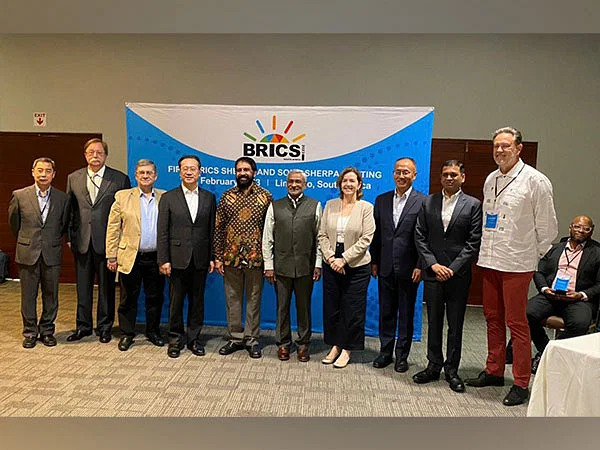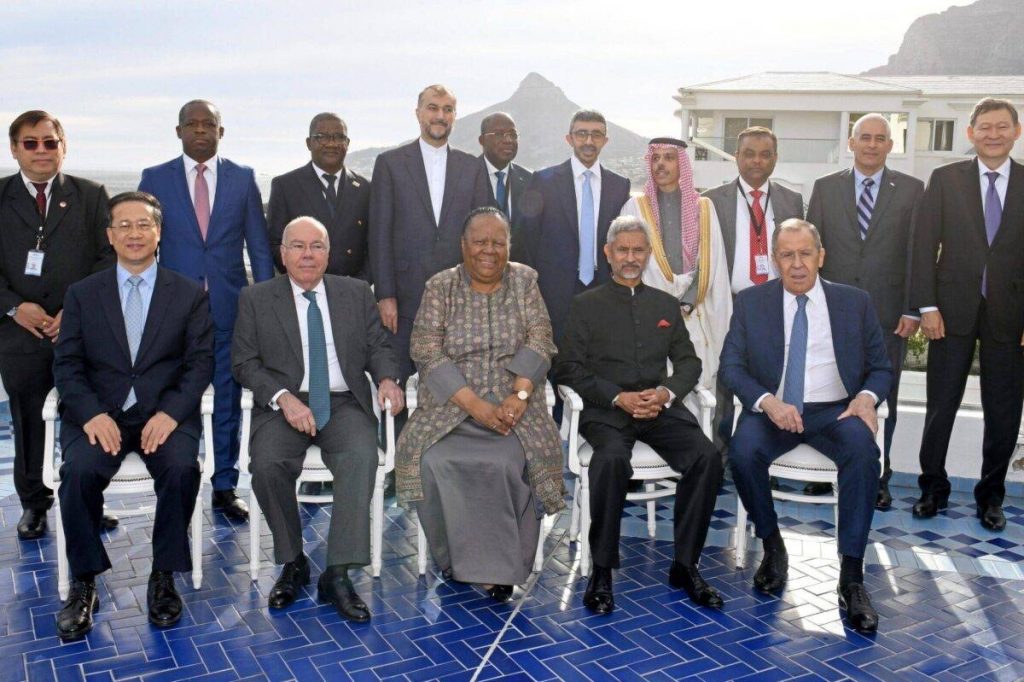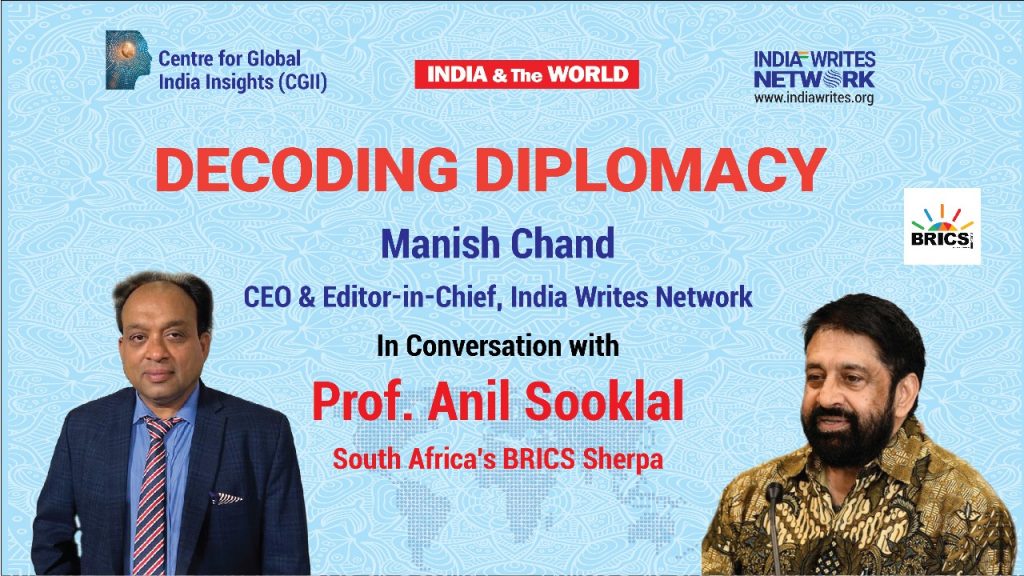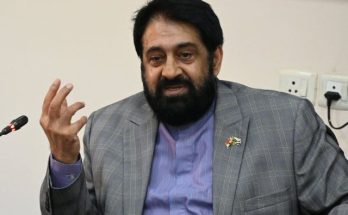South Africa is set to host the 15th BRICS summit in Johannesburg on August 22-24. This is the biggest BRICS summit South Africa will be hosting in terms of the large number of world leaders who have been invited. Around 70 world leaders have been invited by the South African government and more than 40 are reportedly attending. This is also the first in-person BRICS summit after the COVID-induced hiatus of three years. Ahead of the summit, Manish Chand, CEO and Editor-in-Chief, India Writes Network and Centre for Global India Insights, speaks to Prof. Anil Sooklal, South Africa’s BRICS Sherpa, on key issues that will figure on the summit agenda and outcomes one can expect from this transformational summit of the grouping of emerging economies. In this edition of Decoding Diplomacy, Prof. Sooklal, also Ambassador-at-large for Asia and BRICS in South Africa’s Department of International Relations, also speaks about the African Agenda and mainstreaming of the interests of the Global South in the BRICS agenda.
Excerpts from the interview:
Manish Chand: How is South Africa trying to position the summit? What are the major outcomes South Africa would be aiming at the Johannesburg summit?
Prof. Anil Sooklal: South Africa has chosen for its theme “Partnership with Africa.” This has been always our focus whenever we have the opportunity to chair BRICS. So, our theme is “BRICS and Africa – Partnership for Mutually Accelerated Growth, Sustainable Development, and Inclusive Multilateralism.” So, if you unpack our theme, it has four major focus areas. Firstly, using the chairship of South Africa to enhance and deepen the partnership between BRICS and Africa. Secondly, addressing the global economic recovery, firstly as a collective to see what we can do in terms of stimulating growth amongst ourselves. Thirdly, looking at the sustainable development agenda, which has fallen well behind schedule because of the pandemic and the conflict. Fourthly, a standing agenda item of BRICS is the reform of the global governance architecture and therefore inclusive multilateralism. So, these are the key focus areas for us.
Now, in terms of tangibles, we will be looking at enhancing the partnership with Africa through various activities, one of which is we will have a focused attention on the African Continental Free Trade Agreement, and how BRICS can interact with the AFCTA in terms of advancing the goals of the AFCTA for mutual benefit for the BRICS countries and the African continent. It provides a tremendous opportunity because all the BRICS countries have structured mechanisms for interacting with the African continent.
With Africa, India has the India Africa Forum Summit. And I believe next year, there’ll be another edition of that, which is a well-established platform that looks at deepening the relationship between India and the African continent.

Likewise, China has FOCAC with Africa; you also have the Latin America-Africa Forum with Brazil. And just two weeks ago, in St. Petersburg, we had the second edition of the Russia Africa Forum. And I think having the opportunity to have a coordinated approach in terms of BRICS partners, and interacting with Africa, and using the template of the African Continental Free Trade Agreement is an important opportunity. We have invited a large number of countries to the Friends of BRICS meeting that will take place a day after the summit on August 24. President Ramaphosa has invited all of the African countries. So, you’ll have an opportunity for the BRICS leaders to interact with African leaders, both bilaterally and as a collective within the BRICS. I know that India is planning also a side meeting with the leaders of Africa using the opportunity to reflect on the partnership.
Manish Chand: What tangible outcomes can one expect in terms of BRICS’ partnership with Africa?
Prof. Anil Sooklal: Women’s Business Alliance of the BRICS is going to launch the virtual BRICS Africa Women’s Business Alliance platform to facilitate business between Africa and the BRICS countries, especially concentrating on women entrepreneurs and the MSME sector. That’s a very tangible outcome.
We’re also looking at launching the BRICS Africa Centre for Industrial Competencies, with UNIDO being a partner to us. Industrialization is a major focus for the African continent and for the Global South. Having such a facility will also enhance cooperation between Africa and BRICS countries in terms of our industrialization agenda. These are some of the tangible initiatives that we have on the table. We are also looking at setting up a BRICS Africa Just Energy Transitions facility, where we can work together with Africa, and BRICS countries in looking at our energy needs, especially transitioning to clean energy, as well as ensuring that it’s a just transition and sharing experiences on how this happens without negatively impacting our economic growth.
Manish Chand: There are some proposals about BRICS common currency. Some countries are talking about de-dollarisation. What can we expect in this area?
Prof. Anil Sooklal: Let me be very clear -the issue of a BRICS currency is not on the agenda under South Africa’s chairship. But what we are saying is that we must deepen the agreement we have signed amongst our banks, the interbank mechanism to trade in local currencies. Now, amongst BRICS countries, we need to deepen not only trade, but also payment settlement in terms of local currencies. This is the first step. We shouldn’t proceed in haste.
We are not anti-dollar but what we are saying is that we want greater financial independence and flexibility in the way we conduct our economic interaction with the global community. For example, India has signed deals with over 22 countries to trade in the rupee. In Africa, as part of the African Continental Free Trade Agreement, the African Export Import Bank has put in place the Pan African Payment and Settlement System (PAPPS), and 8 central banks and over 20 commercial banks have signed up to this, because Africa is saying that we must be able to trade in our own currency between ourselves. And it’s estimated that as a result of this trading in local currencies within the African continent, we will save at least $5 billion dollars annually.
We need to move away from the dollar-dominated world because the dollar at one stage accounted for 50-60% of global trade. But the US’ trade share today is much less. But yet the major part of global invoicing for trade, over 50% is still in dollars. And we are saying that we need to trade amongst ourselves in our local currencies, we need to be able to borrow in local currencies, we need to make payments settlements in systems that we have created, we need to move away from the governance of the SWIFT system and create our own systems. This is a global trend throughout the global South, which BRICS has initiated.
Manish Chand: So, what you’re talking about is not an anti-West, but a non-West alternative payment mechanism that suits the interests of BRICS countries in the larger Global South. South Africa has also put Global South on the BRICS agenda. In this regard, there is a convergence between South Africa’s BRICS agenda and India’s G20 presidency agenda? What is BRICS approach to the Global South under South Africa’s chairship of BRICS?
Prof. Anil Sooklal: The BRICS’ engagement with the Global South is now a decade old because the first outreach we had was when we chaired in 2013 and we invited African leaders to a dialogue with BRICS. And subsequently, we created the BRICS plus, where we’ve invited leaders of some of the larger Global South, and not just from the region of the country chairing. This year, 15 Global South foreign ministers were invited to the BRICS foreign ministers meeting. There is genuine confidence in the BRICS leadership and what we are championing in terms of addressing the major flaws that exist in the current geopolitical, financial, economic trading architecture. That is why you are seeing such a large number of countries from the Global South, wanting to be associated with BRICS, wanting to be invited to the meetings wanting to become full members.
The Global South has risen, and countries like India have given all of us a new confidence that as countries of the south, we’re no longer poor. We’re not saying that we are rich, but what we are saying is that we are no longer poor and we can’t be dictated to in terms of how we conduct our interaction with the global community. And this is why you’re seeing the rise of the Global South because the economies of many of the Global South countries today are much bigger than global North economies, much bigger than the G7 economies.
India this year overtook the UK to become the world’s fifth-largest global economy. China is the second largest. Brazil and Russia are within the top 10 of global economies. So, the G7 countries are no longer the biggest economies in the world. BRICS countries also ranked amongst the major economies in the world. And this warrants a new approach.

The rise of emerging market developing countries has given a greater sense of confidence to the Global South at large. And that is why you are seeing the reaction of the Global South in terms of the behaviour on the geopolitical front when the Russia-Ukraine crisis broke out and countries were being asked to take positions aligned with the West in terms of the Russia-Ukraine war. We have said no, we are strategically non-aligned. We want to ensure our independence, we don’t want, as India’s wise External Affairs Dr. Jaishankar pointed out, this is Europe’s war, it’s not our war, it’s been imposed on us and the pain and suffering is being felt by Africa, by the developing south, caused by a conflict in Europe. And what is unique is that Europe always comes to Africa to try and solve our problems. But today, you have African leaders going and helping find a solution to the war in Europe. And that shows how the world has changed. That way Africa can go and tell Europe, we can assist you in bringing peace.
Author Profile

- Manish Chand is Founder and Editor-in-Chief of India Writes Network (www.indiawrites.org) and India and World, a pioneering magazine focused on international affairs. He is CEO, Centre for Global India Insights, an India-based think tank focused on global affairs.
Latest entries
 India and the WorldFebruary 17, 2026South-by-South: Focus on people-centric solutions at India AI summit
India and the WorldFebruary 17, 2026South-by-South: Focus on people-centric solutions at India AI summit India and the WorldFebruary 7, 2026Modi hails interim India-US trade deal, Goyal says no concessions made on agriculture
India and the WorldFebruary 7, 2026Modi hails interim India-US trade deal, Goyal says no concessions made on agriculture India and the WorldFebruary 2, 2026Trump announces trade deal with India, Modi ‘delighted’
India and the WorldFebruary 2, 2026Trump announces trade deal with India, Modi ‘delighted’ India and the WorldJanuary 31, 2026Palestinian minister bats for mediatory role for India in ending Gaza conflict
India and the WorldJanuary 31, 2026Palestinian minister bats for mediatory role for India in ending Gaza conflict








